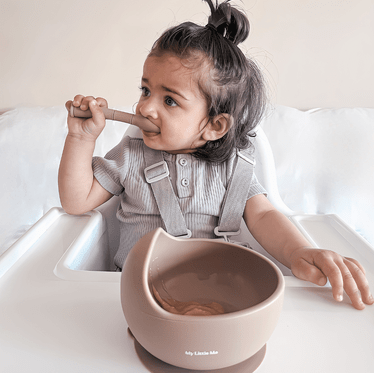One nutrient that is crucial for babies starting on solids is iron. Iron plays a pivotal role in your baby's growth and development, contributing significantly to cognitive function, energy production, and overall health. Babies are born with a natural reserve of iron, which begins to deplete around six months old. At this point, ensuring they receive enough iron from their diet becomes essential to meet their increasing nutritional needs. This blog will explore why iron is so important for infants and highlight iron-rich foods suitable for babies beginning their journey with solid foods.
Why is Iron So Important?
Iron is a mineral critical for the formation of haemoglobin, the protein in red blood cells that transports oxygen throughout the body. In babies, iron is particularly vital as they experience rapid growth and development, including the expansion of their blood volume and the development of their brain. Adequate iron intake during infancy is crucial for optimal cognitive and motor development, immune function, and overall health.
Different Sources of Iron
Dietary iron comes in two forms: haem and non-haem. Haem iron, found in meat, poultry, and fish, is less influenced by other dietary factors and is relatively well-utilised by the body. Non-haem iron, primarily found in plant-based foods, is not as readily absorbed as haem iron but can still significantly contribute to overall iron intake, especially when consumed alongside vitamin C-rich foods, which enhance its absorption.
Iron-Rich Foods for Babies Starting on Solids
Understanding the importance of iron for babies starting solids, let's explore some iron-rich foods that can be introduced into their diet:
Haem Iron Sources:
Chicken liver is exceptionally rich in iron. However, due to its high vitamin A content, it should be consumed in moderation to avoid potential toxicity. Only serve your baby no more than 1 to 2 teaspoons of finely mashed chicken liver per week.
Beef and lamb are exceptional sources of haem iron, which is easily absorbed by the body. These meats can be prepared as a smooth purée or finely minced to ensure they are easy to consume and digest.
Shellfish, including mussels and oysters, are excellent sources of haem iron. When introducing shellfish, ensure they are thoroughly cooked to avoid any health risks and start with small amounts to monitor for any allergic reactions.
Eggs: The yolks offer a valuable source of iron. For safe and easy consumption, ensure they are thoroughly cooked, then either mash or finely chop them before serving to your baby.
Fish, such as salmon or sardines, when cooked and flaked, provide a valuable source of iron and essential omega-3 fatty acids, which are vital for brain development. To ensure safety and health, opt for low-mercury varieties and introduce them carefully to monitor for any potential allergic reactions.
Non-Haem Iron Sources:
Tofu, an excellent plant-based source of non-haem iron, is ideally suited for babies’ diets. It can be easily prepared by mashing it to a smooth consistency or cutting it into small, soft cubes.
Green leafy vegetables such as spinach and kale are abundant in iron, making them an excellent addition to your baby's diet. For easy consumption, these can be gently steamed until soft and then either mashed to a suitable texture or blended into a nutritious smoothie.
Legumes, including lentils, chickpeas, black beans, and kidney beans, are excellent plant-based sources of iron and can be introduced as purées or mixed with other foods for added texture.
Cashew butter is a versatile plant-based source of iron that can be easily incorporated into your baby's diet. For safe consumption, thin the cashew butter with breast milk, formula, or water before offering it to your baby.
To maximise the absorption of non-haem iron, it's beneficial to accompany iron-rich foods with those high in vitamin C. Options like oranges, kiwifruit, or bell peppers not only enhance iron uptake but also add a burst of flavour and nutrition to your meals.
Conclusion
Starting solids is an adventure for both parents and babies. Offering a variety of iron-rich foods ensures your baby receives a balanced intake of nutrients. An iron-rich diet will help ensure your baby's growth, cognitive development, and overall health flourish. Always consult with a health professional before making significant changes to your baby's diet. If you suspect your child might be iron-deficient, it's crucial to seek medical advice.
